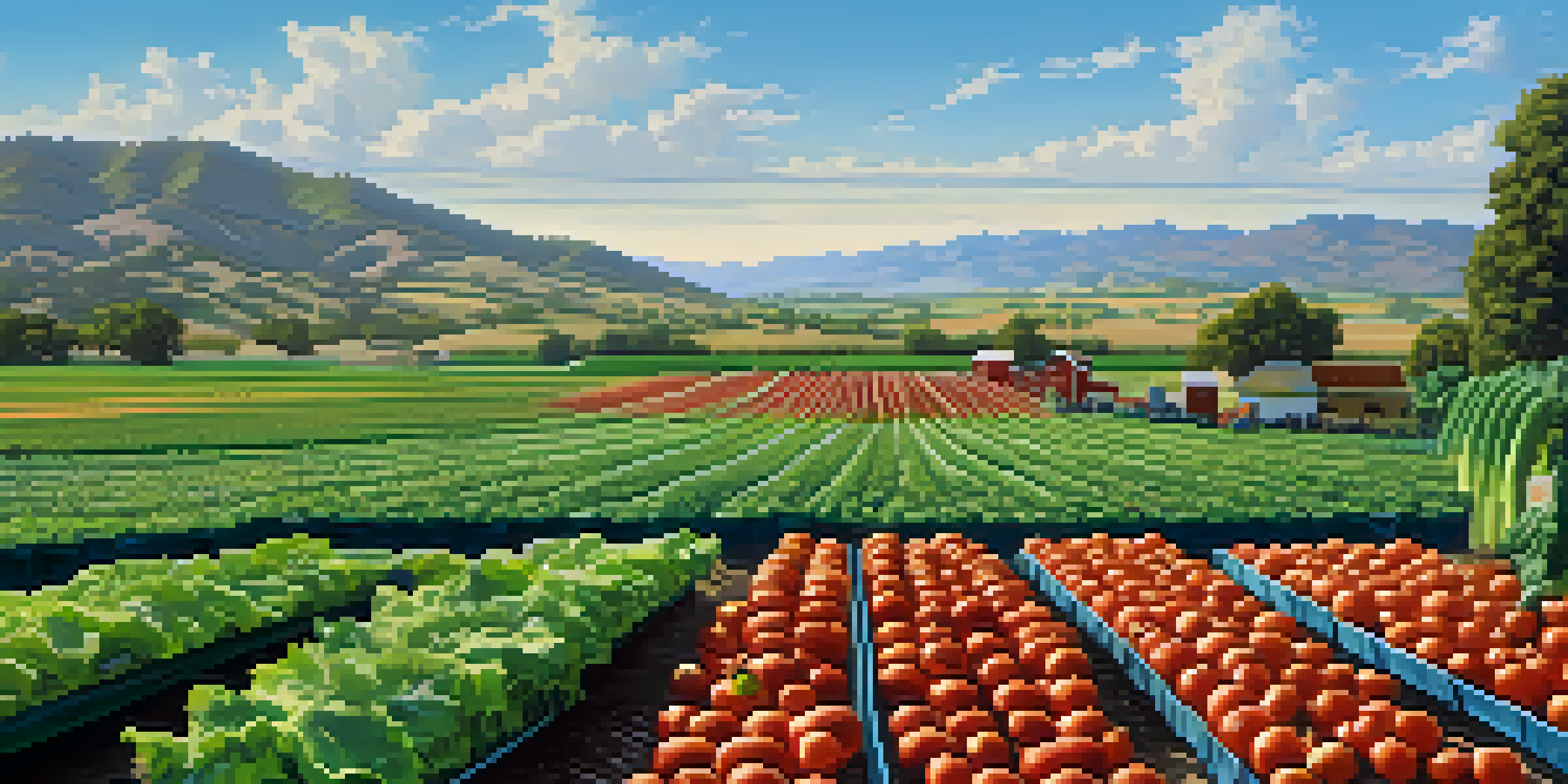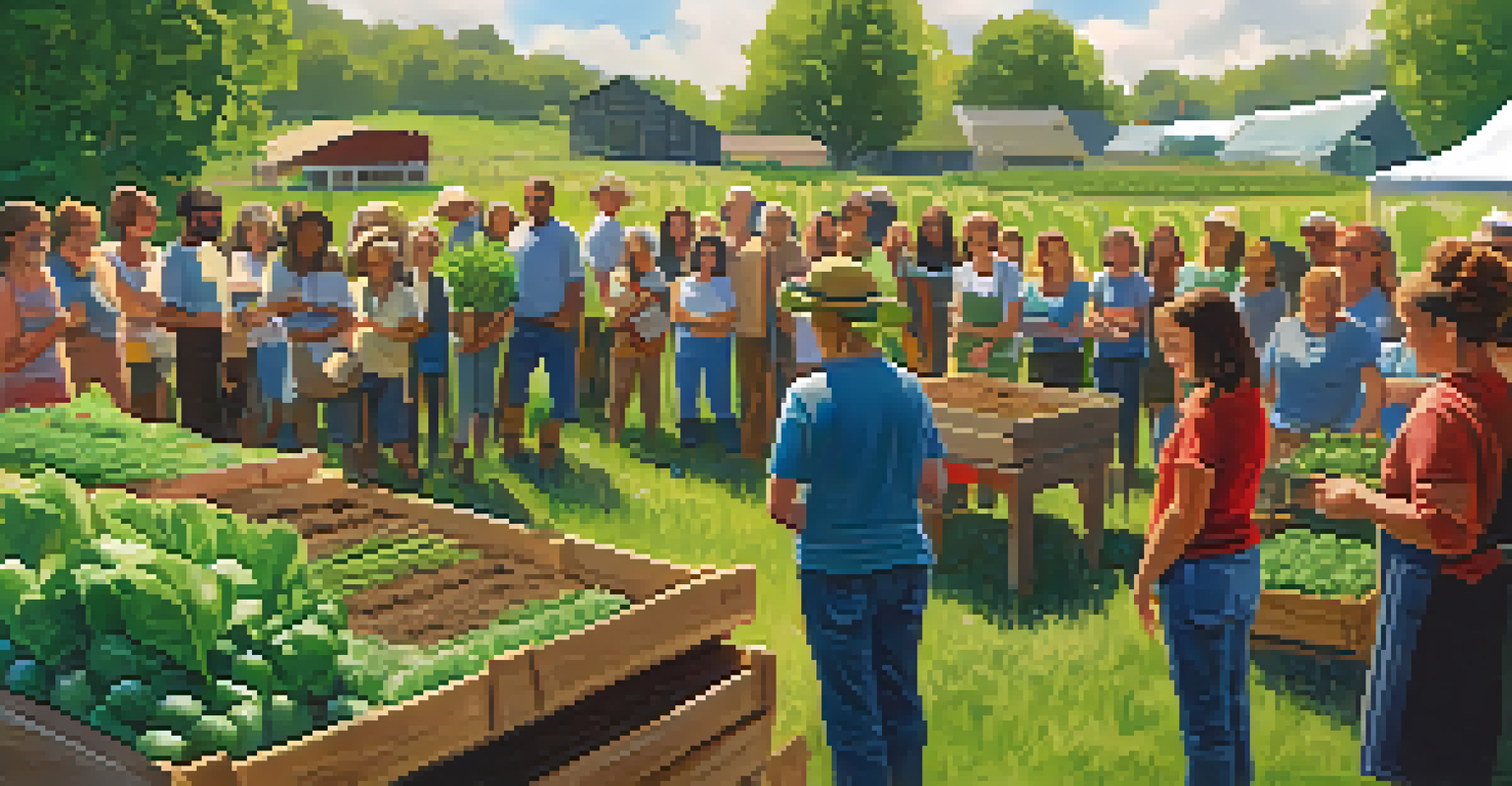Sustainable Farming Practices in California's Agriculture Sector

Understanding Sustainable Farming and Its Importance
Sustainable farming refers to agricultural practices that focus on meeting current food needs without compromising future generations' ability to do the same. This approach emphasizes environmental health, economic profitability, and social equity. In California, where agriculture is a significant part of the economy, adopting sustainable practices is crucial for preserving the state's rich natural resources.
The future will be green, or not at all.
One of the key reasons sustainable farming is vital is its role in combating climate change. Traditional farming methods can lead to soil degradation, water depletion, and greenhouse gas emissions. In contrast, sustainable practices aim to restore ecosystems and improve soil health, helping to sequester carbon and reduce the overall environmental footprint of agriculture.
Moreover, sustainable farming can enhance food security by promoting biodiversity and resilient farming systems. By diversifying crops and using organic methods, farmers can produce a wider variety of healthy foods, which not only benefits consumers but also strengthens local economies and communities.
Water Conservation Techniques in Sustainable Farming
California has long faced challenges related to water scarcity, making water conservation a critical aspect of sustainable farming. Farmers are increasingly adopting techniques like drip irrigation, which allows water to be delivered directly to the plant roots, minimizing waste. This method not only conserves water but also leads to healthier crops by reducing the risk of overwatering.

Another innovative approach is the use of rainwater harvesting systems. These systems collect and store rainwater for irrigation, providing a sustainable water source that also reduces reliance on groundwater. By utilizing this natural resource, farmers can effectively manage water usage while preparing for periods of drought.
Sustainable Farming Benefits Future
Sustainable farming practices ensure that current food needs are met while protecting the environment for future generations.
Additionally, crop selection plays a vital role in water conservation. Farmers are choosing drought-resistant crop varieties that require less water while still providing high yields. This not only conserves water but also supports the local ecosystem by reducing the need for chemical fertilizers and pesticides, which can harm the environment.
Soil Health and Regenerative Agriculture Practices
Healthy soil is the foundation of sustainable farming, and regenerative agriculture practices focus on improving soil health through natural methods. Techniques such as cover cropping, which involves planting crops that protect and enrich the soil during off-seasons, help prevent erosion and maintain nutrient levels. This practice not only benefits the soil but also enhances biodiversity on the farm.
Sustainable agriculture is an approach that maintains the health of the environment, the health of the economy, and the health of the community.
Compost application is another effective way to boost soil health. By recycling organic waste into nutrient-rich compost, farmers can enrich their soil naturally, reducing the need for synthetic fertilizers. This practice not only contributes to healthier crops but also helps in carbon sequestration, thus combating climate change.
Moreover, no-till farming is gaining traction as a way to protect soil structure and reduce erosion. By minimizing soil disturbance, farmers can promote a thriving ecosystem of beneficial microorganisms, leading to healthier plants and improved yields. These regenerative practices are essential for long-term sustainability in California's agricultural landscape.
Integrated Pest Management (IPM) for Sustainable Crop Protection
Integrated Pest Management (IPM) is a holistic approach to pest control that emphasizes the use of natural predators and ecological practices rather than relying solely on chemical pesticides. By understanding pest life cycles and their natural enemies, farmers can create a balanced ecosystem that minimizes pest issues while protecting beneficial organisms.
For example, introducing ladybugs and other beneficial insects can help control aphid populations without the need for harmful pesticides. Additionally, practices like crop rotation and intercropping can disrupt pest cycles, making it harder for them to establish themselves. These techniques not only protect crops but also promote biodiversity in the agricultural ecosystem.
Water Conservation is Essential
Techniques like drip irrigation and rainwater harvesting help farmers manage water resources effectively in drought-prone areas.
Furthermore, IPM strategies often involve monitoring pest populations and using targeted interventions only when necessary. This approach reduces chemical inputs, leading to cleaner, safer produce for consumers and a healthier environment. By adopting IPM, California farmers can maintain productivity while safeguarding their land and community.
The Role of Organic Farming in Sustainability
Organic farming has gained significant popularity as a sustainable agricultural practice, focusing on natural methods and avoiding synthetic chemicals. By adhering to strict organic standards, farmers promote soil health, biodiversity, and environmental stewardship. In California, organic farming not only meets consumer demand for healthier food options but also supports sustainable land use.
One of the key benefits of organic farming is its emphasis on crop rotation and polyculture, which helps maintain soil fertility and reduces pest problems. These practices create a more resilient farming system that can better withstand environmental stresses, such as drought and disease. As a result, organic farms often yield high-quality produce while minimizing their ecological impact.
Moreover, organic farming supports local economies by fostering direct relationships between farmers and consumers. Farmers' markets and community-supported agriculture (CSA) programs allow consumers to purchase fresh, organic produce while supporting sustainable practices. This connection strengthens community ties and promotes awareness of the importance of sustainability in agriculture.
Technology's Impact on Sustainable Farming Practices
Technology has become a powerful ally in the quest for sustainable farming, offering innovative solutions that enhance efficiency and reduce environmental impact. Precision agriculture, for instance, utilizes data analytics and GPS technology to monitor crop conditions and optimize resource use. This approach allows farmers to apply water, fertilizers, and pesticides more accurately, minimizing waste and maximizing yields.
Additionally, drones and satellite imagery are increasingly being used to assess crop health and monitor soil conditions from above. These tools provide valuable insights, enabling farmers to make informed decisions about their practices and interventions. By embracing technology, farmers can achieve sustainability goals while maintaining productivity in a competitive market.
Community Engagement Drives Change
Educating consumers and fostering community support promotes sustainable farming practices and strengthens local economies.
Moreover, mobile applications and online platforms are helping farmers connect with resources and share knowledge about sustainable practices. These digital tools foster collaboration among farmers, researchers, and consumers, creating a community focused on sustainability. As technology continues to evolve, its potential to drive sustainable farming practices will only grow.
Community Engagement and Education in Sustainable Practices
Community engagement and education play crucial roles in promoting sustainable farming practices. Farmers, consumers, and local organizations can work together to raise awareness about the benefits of sustainable agriculture. Workshops, farm tours, and educational programs can help bridge the gap between farmers and consumers, fostering a deeper understanding of food systems.
Moreover, local governments and non-profits often support initiatives that encourage sustainable farming. Grants, technical assistance, and resources for farmers can help them transition to more sustainable practices. Community support can also create a market for sustainably produced goods, allowing farmers to thrive economically while prioritizing environmental health.

Furthermore, schools and educational institutions can incorporate sustainable agriculture into their curricula, teaching future generations about the importance of responsible farming practices. By instilling these values early on, we can ensure a more sustainable future for California's agriculture sector and the planet as a whole.